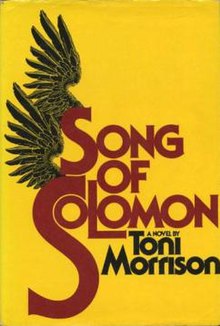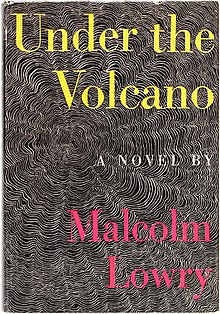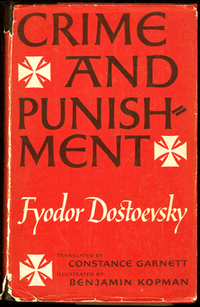…

#93 Song of Solomon, Toni Morrison
I wonder what it’s like to be casually extraordinary. Like, to casually accept prestigious writing awards and casually boggle minds. I’ll have to ask Toni Morrison someday—if, that is, I don’t collapse at her feet in a fit of casual tears.
Song of Solomon was (necessarily) a letdown after Beloved, but not by much. The story centers on Macon “Milkman” Dead and his dysfunctional family. After his ex-lover and his best friend attempt to kill him, on separate occasions and for separate reasons, Milkman journeys to the land of his ancestors in Shalimar, Virginia. There he hears the legend of his grandfather, Solomon, who escaped slavery in the South by flying back to Africa.
A multi-perspective novel with a touch of magical realism, Song of Solomon (1977) fits nicely within Morrison’s rich literary legacy… without, in my mind, transcending it. That said, the gaping emotional wreckage of these characters, wandering astray on their search for an identity, is palpable in a way that only Morrison could render. Just two books in to her long list of publications, I can safely consider all of her work a must-read.
Is It One of the Greatest Books of All Time?
It’s not Morrison’s best work, IMHO, but she’s still way ahead of the competition by most measurements.
Favorite Quotes:
Milkman could hardly breathe. Hagar’s voice scooped up what little pieces of heart he had left to call his own.
Macon kept telling me that the things we was scared of wasn’t real. What difference do it make if the thing you scared of is real or not?
Stop picking around the edges of the world. Take advantage, and if you can’t take advantage, take disadvantage. We live here. On this planet, in this nation, in this country right here. Nowhere else! We got a home in this rock, don’t you see! Nobody starving in my home; nobody crying in my home, and if I got a home you got one too! Grab it. Grab this land! Take it, hold it, my brothers, make it, my brothers, shake it, squeeze it, turn it, twist it, beat it, kick it, kiss it, whip it, stomp it, dig it, plow it, seed it, reap it, rent it, buy it, sell it, own it, build it, multiply it, and pass it on—can you hear me? Pass it on!
Read: 2016

#80 Under the Volcano, Malcolm Lowry
Malcolm Lowry’s 1947 novel—the last one he completed—depicts the final hours of Geoffrey Firmin’s alcohol-fueled life as a British consul in the shadow of two Mexican volcanoes. Full of literary references and allusions, Under the Volcano could serve as Exhibit A in my theory on Literary Incest (references within the classics to other classics). Lowry invokes, among others, Shakespeare, Dante, Baudelaire, and (especially) Marlowe’s Doctor Faustus.
For all that, though, Under the Volcano only appealed to me stylistically—not thematically. Consider this passage:
It was a hangover like a great dark ocean swell finally rolled up against a foundering steamer, by countless gales to windward that have long since blown themselves out.
And this one:
There was something in the wild strength of this landscape, once a battlefield, that seemed to be shouting at him, a presence born of that strength whose cry his whole being recognized as familiar, caught and threw back into the wind, some youthful password of courage and pride—the passionate, yet so nearly always hypocritical, affirmation of one’s soul perhaps, he thought, of the desire to be, to do, good, what was right. It was as though he were gazing now beyond this expanse of plains and beyond the volcanoes out to the wide rolling blue ocean itself, feeling it in his heart still, the boundless impatience, the immeasurable longing.
Ooh, and this one:
He watched the clouds: dark swift horses surging up the sky. A black storm breaking out of its season! That was what love was like, he thought; love which came too late.
Lovely, right? RIGHT?? Sigh. If only the plot were as compelling as the writing. The story failed, at the end of the day (pun intended!), to keep a steady grip on my attention. Far from sitting on the edge of my spectator’s seat, emotionally invested in Geoffrey’s war with himself, I found myself wandering away from the battlefield, bored with the tedium of it all.
Here’s hoping my own end is quicker, less painful, and less lonely than the Consul’s—and my life story a little more cheerful.
Is It One of the Greatest Books of All Time?
There’s so much potential here. For me, though, this book ultimately falls short of Greatness.
Favorite Quotes:
I learn that the world goes round so I am waiting here for my house to pass by.
Good God, if our civilization were to sober up for a couple of days it’d die of remorse on the third.
What is man but a little soul holding up a corpse?
Read: 2017

#37 Nostromo, Joseph Conrad
If Future Me had told Past Me, before I read Nostromo, that it would encompass love, betrayal, political intrigue, rebellion, shipwreck, and buried treasure, Past Me would have been like, “Yeah, but Joseph Conrad wrote it. So it’s monumentally boring, right?”
For what it’s worth, Past Me would have been right. And Future Me was, indeed, monumentally bored. In broad strokes, Nostromo (1904) is a story of colonialism and revolution set in the (fictional) South American country of Costaguana. In finer detail, it’s the series of events that lead an “incorruptible” man to corruption. (Spoiler alert: Those events are “greed” and “vanity.”) (Spoiler alert: Duh.)
F. Scott Fitzgerald once said, “I’d rather have written Nostromo than any other novel.” Robert Penn Warren called it “one of the few mastering visions of our historical moment and our human lot.” Both of them, in my mind, could work on their self-esteem, because I liked The Great Gatsby and All the King’s Men infinitely better than Nostromo.
Is It One of the Greatest Books of All Time?
I think I’ve said enough.
Favorite Quotes:
I suppose they are homesick. I suppose everybody must be always just a little homesick.
We have disturbed a good many snakes in that Paradise, Charley, haven’t we?
All the earth made by God is holy; but the sea, which knows nothing of kings and priests and tyrants, is the holiest of all.
Read: 2016

#50 Tom Jones, Henry Fielding
For all its fame, acclaim, and longevity, Tom Jones (1749) didn’t leave much of an impression on me. Over eighteen books, we accompany the eponymous Tom Jones on his adventures and misadventures across the English countryside. Tom’s wild antics and eventual reformation made it hugely popular among 18th century readers, and the book remains influential even today.
Henry Fielding wrote much of himself into Tom Jones, from his unbridled personality to his political objections, and he remains a credit to the name of satire. Still, a (charmingly) cheeky narrator and an (occasionally) sparkling wit weren’t enough to rescue this book from my apathy. I may give it a reread someday, but only if my TBR is barren.
Is It One of the Greatest Books of All Time?
I’m getting a little impatient with the chronic conflation of the world’s earliest novels with the world’s greatest novels. Tom Jones serves as a model for what came later, yes. But we’ve had a lot of time to practice and perfect the novel since.
Favorite Quotes:
It does not smell like a Christian.
For it is very uncommon, I believe, for men to ascribe the benefactions they receive to pure charity, when they can possibly impute them to any other motive.
Twelve times did the iron register of time beat on the sonorous bell-metal, summoning the ghosts to rise, and walk their nightly round. In plainer language, it was twelve o’clock.
Read: 2016

#74 Crime and Punishment, Fyodor Dostoyevsky
If you’ve ever felt predestined to murder someone, and even justified in doing so, because murder is excusable for “higher” beings such as Napoleon, and ethics are just crutches for the weak—please, please rethink your value system. It’s possible you are actually a narcissist with a shoddy moral compass. Maybe.
Your name might also be Raskolnikov, and you might have been invented by Dostoyevsky. His ultra-famous Crime and Punishment (1866) serves as a profile in courage cowardice—a mug shot taken with a macro lens—of an angsty killer on the run. And by “on the run,” I mean wandering around acting transparently guilty, especially in his meetings with the local detective.
If character study is your thing, Crime and Punishment will probably be a page-turner. I can recall more expansive psychological portraits on The List, but never a more intensive one. We are tipped straight into Raskolnikov’s brain two days before he axe-murders a crooked pawnbroker and her half-sister, and don’t emerge from his foggy thought lanes until he’s doing time in a Siberian prison.
Note, if you will, that playing “And Then the Murders Began” would barely change a thing about this masterpiece…
…which, in my book, equals awesome.
Is It One of the Greatest Books of All Time?
I’m gonna have to go with YES.
Favorite Quotes:
Lying is man’s only privilege over all other organisms.
Suffering and pain are always obligatory for a broad consciousness and a deep heart. Truly great men, I think, must feel great sorrow in this world.
Just give yourself directly to life, without reasoning; don’t worry—it will carry you straight to shore and set you on your feet.
Read: 2016
…
This is the final installment in my Quick Reviews series! I’m sorry to have left so many “meh” books to the end, for your sake and mine. I’ll be sure to do things differently the next time I read and review The 100 Greatest Books of All Time (a.k.a. never, or at least not in this lifetime).
My last three reviews for The Challenge—Don Quixote, War and Peace, and Faust—will be up soon. In the meantime, happy reading!
